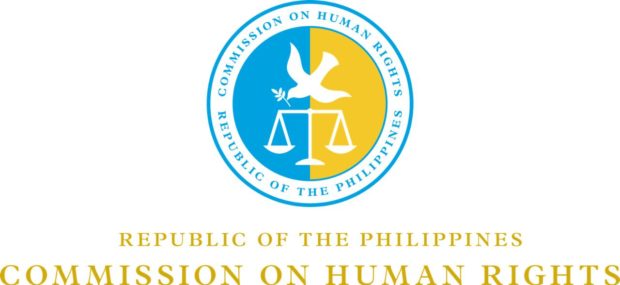CHR upset over Duterte veto of Human Rights Institute in 2022 nat’l budget

Logo of the Commission on Human Rights
MANILA, Philippines — The Commission on Human Rights (CHR) on Tuesday lamented the decision of President Rodrigo Duterte to veto the establishment of a Human Rights Institute (HRI) under the proposed 2022 national budget.
According to CHR, the planned creation of the HRI would have been crucial a step in the promotion of rights education in the country.
CHR Commissioner Karen Gomez-Dumpit said in a statement that the HRI is a project that would allow the Commission to fulfill its mandate on human rights research and information dissemination – as enshrined in the 1987 Constitution.
The portion establishing the HRI was among five budget items vetoed by Duterte before signing the national spending plan for 2022 into law. Duterte signed on December 30, 2021, the proposed P5.024 trillion national budget this year, which is now known as Republic Act No. 11639 or the General Appropriations Act (GAA) of 2022.
“[CHR] is saddened by the news of the President’s direct veto of the item in the [GAA] Act for 2022 which seeks to help establish the [HRI]—a flagship program of the CHR that was launched during the 2021 Human Rights Day—to better carry forward its mandate under the 1987 Constitution ‘to establish a continuing program of human rights research, education, and information to enhance the respect for the primacy of human rights’,” said Gomez-Dumpit.
Article continues after this advertisement“CHR respectfully maintains that this item appropriation is for the discharge of its constitutional mandate,” she added.
Article continues after this advertisementThe CHR official further explained that the establishment of the HRI, which was launched by the Commission during the celebration of the International Human Rights Day in December, would have ensured that crucial human rights education and materials are made available to the people so that they are made aware of what their rights are and what the government’s obligations are.
“The establishment of a Human Rights Institute is a longtime vision of previous and present commissions in ensuring crucial human rights education is made accessible to the people and for government personnel to better understand their role as primary duty-bearers in fulfilling human rights obligations to faithfully comply with human rights standards and principles,” Gomez-Dumpit noted.
“With regards to the problems of historical revisionism, the HRI was envisioned to fight against revisionism and provide a gateway for robust human rights education programs with other government institutions,” she also said.
In his veto message, Duterte said that creating offices should be subject to a comprehensive review. He also said that there was no funding appropriated for the office even if the CHR said that they will use existing resources to support it.
“The creation of an institute, just like other offices, should be subject to a comprehensive review of the mandate, mission, objectives and functions, systems and procedures, and programs, activities, and projects, as well as the corresponding structural, functional, and operational adjustments in an organization, including the necessary staffing and funding requirements,” Duterte’s veto message reads.
READ: Duterte vetoes establishment of CHR’s Human Rights Institute from 2022 budget
But aside from the HRI veto, CHR also expressed disappointment on the removal of the Department of Transportation’s (DOTr) Gender Responsive Restroom Program, which the Commission believes is a “key gender and human rights item,” in the 2022 national budget.
“Under the Magna Carta of Women or Republic Act No. 9710, all government agencies are mandated to adopt gender mainstreaming as a strategy to promote women’s human rights and eliminate gender inequality. This entails the conduct of gender analysis to pursue programs, activities, and projects that respond to the identified gender issues of the agency,” Gomez-Dumpit pointed out in a separate statement.
“The DOTr’s mandate includes ensuring fast, safe, efficient, and reliable transportation services. Aside from the Magna Carta of Women, gender-inclusive restrooms also implement Republic Act No. 11313 or the Safe Spaces Act. This appropriations item sought to address a specific gender and human rights issue— it was meant to recognize the diversity of DOTr clients and ensure safe access to essential facilities without discrimination,” she added.
Despite the veto of the two measures, Gomez-Dumpit said CHR will continue working with various government offices like Congress and the Department of Budget and Management (DBM) to ensure that their programs are included in the next iterations of the budget.
“Despite the direct veto, we here at CHR remain most grateful to our legislators for the inclusion of this item in the proposed General Appropriation Bill […] In the face of this development, the CHR will continue to pursue this initiative through further discussions with the Department of Budget and Management and with Congress for proposed legislation, and/or other modalities where educational institutes have been established by other constitutional bodies, such as the Civil Service Institute of the Civil Service Commission,” she said.
“While the President’s veto is disheartening, we view this as an opportunity to press on. We shall continue to pound the walls of impunity to convey the message of human rights straight and across to our people,” she added.
KGA
For more news about the novel coronavirus click here.
What you need to know about Coronavirus.
For more information on COVID-19, call the DOH Hotline: (02) 86517800 local 1149/1150.
The Inquirer Foundation supports our healthcare frontliners and is still accepting cash donations to be deposited at Banco de Oro (BDO) current account #007960018860 or donate through PayMaya using this link.